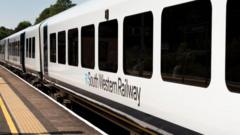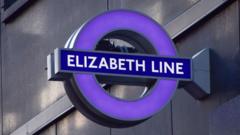Is Fare Evasion Costing Rail Firms £45.5 Million?

Published: 2025-10-20 06:00:30 | Category: technology
South Western Railway (SWR) has reported an alarming annual revenue loss of £45.5 million due to ticketless travel, which currently stands at about 3.9%. This figure highlights the ongoing challenge of fare evasion within the rail industry, which collectively loses nearly £240 million annually. SWR is actively working to reduce fare evasion and improve passenger experiences, but concerns remain about service quality and accountability after its recent renationalisation.
Last updated: 30 October 2023 (BST)
- SWR's annual revenue loss from ticketless travel is estimated at £45.5 million.
- The current rate of fare evasion is approximately 3.9%, down 40% since 2017.
- Across the UK rail industry, fare evasion costs nearly £240 million each year.
- SWR has reimbursed over £370,000 for delays, covering hotel and taxi costs.
- 7,293 trains were short formed last year, affecting service reliability.
Understanding Ticketless Travel and Its Impact
Ticketless travel, defined as the act of using train services without a valid ticket, poses a significant financial challenge to rail operators. For SWR, this results in a substantial loss of revenue that could otherwise be reinvested into improving services. The reported 3.9% fare evasion rate indicates that nearly one in every 25 passengers is travelling without paying. This statistic raises important questions about the measures being taken to deter such behaviour.
The Financial Consequences of Fare Evasion
With an estimated £240 million lost across the UK's rail industry due to fare evasion, the financial implications are profound. This loss not only affects individual rail operators like SWR but also has wider ramifications for the UK's transportation infrastructure. The potential for increased ticket prices or reduced services looms if fare evasion is not adequately addressed.
Recent Developments at South Western Railway
In response to the alarming statistics regarding ticketless travel, SWR has expressed its commitment to reducing fare evasion. Since 2017, the company has successfully decreased the rate of ticketless travel by 40%. SWR's spokesperson stated, "Our revenue protection team is focused on effectively deterring fare evasion and bringing down the rate of ticketless travel."
Efficiency Measures and Challenges
Despite these efforts, challenges remain for SWR, particularly following its recent renationalisation. Jeremy Varns, a member of the SWR Watch travel group, has raised concerns about the perceived decline in service quality since the change in management. He highlighted a lack of transparency regarding contracts between the operator and the government, which he believes is essential for accountability.
The Broader Context: Rail Industry Challenges
While SWR's statistics are concerning, they reflect a broader issue within the UK rail industry. The £240 million annual loss to fare evasion indicates systemic challenges that need to be tackled not just by SWR but by all rail operators. Addressing fare evasion effectively requires a multi-faceted approach, including improved enforcement, better customer education, and perhaps even adjusting ticket pricing strategies to encourage compliance.
Operational Issues: Delays and Service Shortfalls
In addition to ticketless travel, SWR has faced operational challenges that have affected its reliability. The company reported reimbursing passengers over £370,000 for hotel and taxi costs due to delays and cancellations. Furthermore, 7,293 trains were short formed last year, meaning they had fewer carriages than planned. This situation is often attributed to train faults and other operational issues.
Passenger Experience and Expectations
Passenger experience is at the heart of any successful rail service. The ongoing issues of ticketless travel, service delays, and short-formed trains have a direct impact on how customers perceive SWR. As Varns articulated, it is crucial for the railway to provide a positive experience and ensure that operational decisions do not add to the frustrations of inconvenienced passengers.
Commitment to Customer Care
SWR has reiterated its "duty of care" to customers, stating that in times of significant disruption, it makes every effort to ensure that passengers can complete their journeys. The company follows the National Rail Conditions of Travel, which obligates it to provide alternative travel means, such as refundable taxis or overnight accommodation when necessary.
Looking Ahead: The Future of South Western Railway
As SWR navigates its transitional arrangement post-renationalisation, the focus will likely remain on improving fare compliance and passenger satisfaction. The introduction of new trains aims to enhance the current fleet's resilience, potentially addressing the issue of service reliability moving forward.
With the rail industry's financial health at stake, it is imperative for SWR and other operators to implement effective strategies to combat fare evasion while simultaneously improving overall service quality. The future of rail travel in the UK depends on these improvements, ensuring that passengers feel confident in their travel choices.
FAQs
What is the current rate of ticketless travel for SWR?
The current rate of ticketless travel for South Western Railway (SWR) is approximately 3.9%, which is a reduction of 40% since 2017.
How much revenue is lost due to fare evasion in the UK?
It is estimated that fare evasion costs the UK rail industry nearly £240 million annually, with South Western Railway losing about £45.5 million of that amount.
What measures is SWR taking to reduce fare evasion?
SWR is focusing on enhancing its revenue protection team and implementing measures aimed at deterring fare evasion effectively, which has already seen a decrease in ticketless travel rates.
What compensation does SWR provide for delays?
In the event of delays, SWR has reimbursed over £370,000 for hotel and taxi expenses, providing alternative travel means as stipulated by the National Rail Conditions of Travel.
What does it mean for a train to be short-formed?
A short-formed train refers to a service that operates with fewer carriages than originally planned, which can lead to overcrowding and other service disruptions.
As the railway industry grapples with these significant challenges, the focus on improving passenger experience and reducing fare evasion is crucial. How can industry stakeholders collaborate to ensure a more efficient and reliable rail network? #RailwayReform #FareEvasion #PassengerExperience



